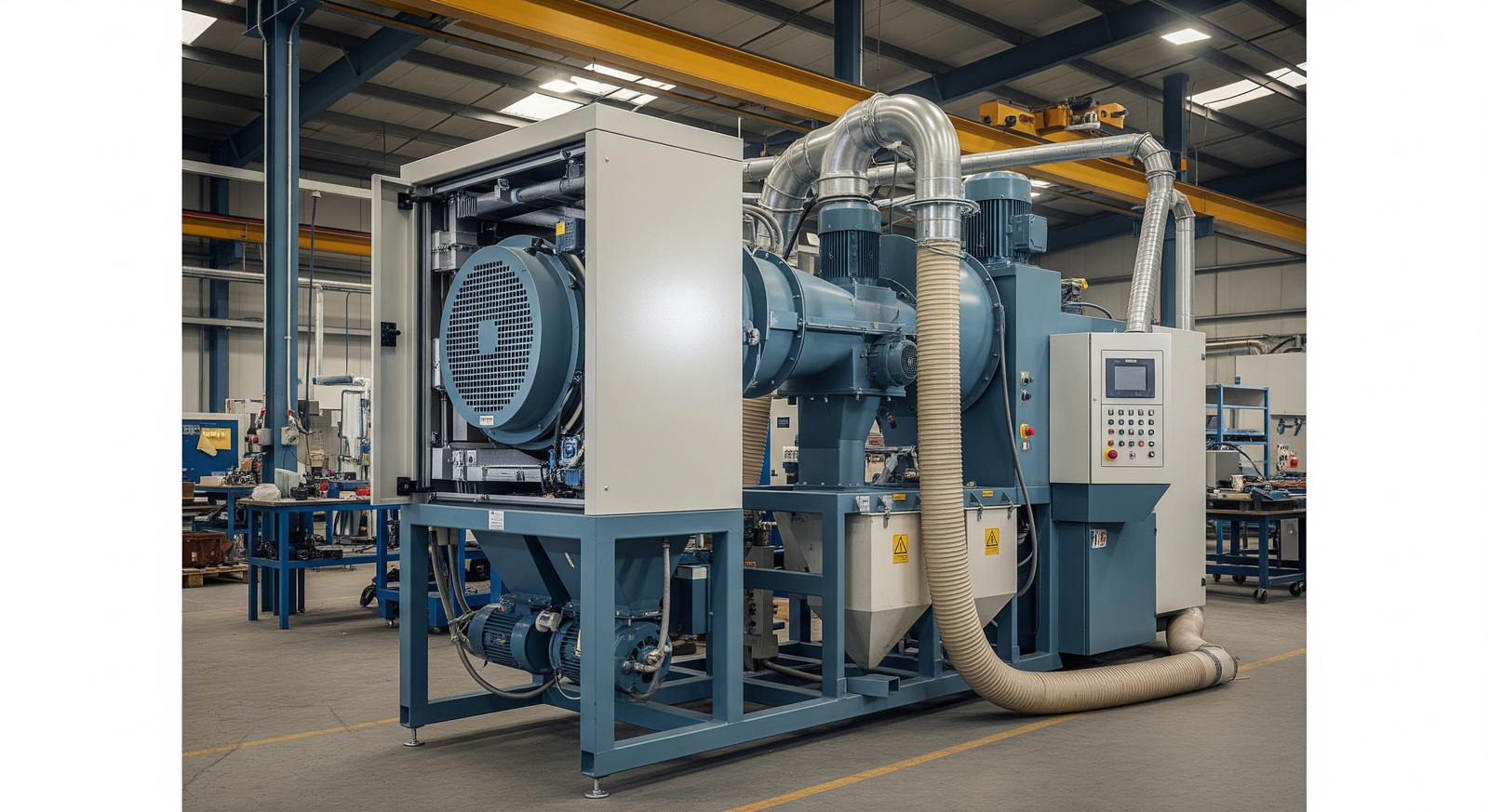In today’s industrial settings, air quality is a critical factor for both productivity and health. The industrial dust extractor plays a vital role in removing airborne contaminants, protecting equipment, improving visibility, and ensuring compliance with environmental and safety standards. These systems are indispensable in factories, workshops, and warehouses where processes like cutting, grinding, sanding, or milling generate significant dust particles.
This article offers a detailed overview of the industrial dust extractor, insights into cost, location-specific needs, types, and the offerings of top industrial dust extractor manufacturers and industrial dust extractor manufacturers in the UK.
What is an Industrial Dust Extractor?
An industrial dust extractor is a high-powered device designed to capture, filter, and remove dust and airborne particles from industrial and commercial environments. It typically consists of the following components:
- Inlet nozzle/hood: Captures dust at the source.
- Filtration system: Removes particulate matter from the air using filters (HEPA, bag, or cartridge filters).
- Collection unit: Stores the filtered dust for safe disposal.
- Motor/fan unit: Provides suction power to draw in contaminated air.
Unlike domestic vacuum cleaners, an industrial dust extractor is built for heavy-duty and continuous operation in challenging environments.
Applications of Industrial Dust Extractors
These systems are widely used in various industries to maintain clean air:
- Woodworking: Capturing sawdust from routers, saws, and sanders.
- Metalworking: Removing fine metallic particles from welding and grinding.
- Pharmaceuticals: Managing powder handling and ensuring sterile environments.
- Automotive: Dust removal during sanding, painting, and finishing processes.
- Construction: Reducing concrete and drywall dust during demolition or remodeling.
In every use-case, a robust industrial dust extractor helps in maintaining workplace hygiene, equipment longevity, and worker health.
Types of Industrial Dust Extractors
There are multiple types of dust extractors to suit specific applications and industries:
1. Portable Dust Extractors
- Easy to move and ideal for small workshops or mobile operations.
- Generally used in construction and onsite repair work.
2. Centralized Dust Extraction Systems
- Designed for larger facilities and installed as a central unit.
- Ducting connects multiple machines to a single dust extraction point.
3. Cyclonic Dust Extractors
- Use centrifugal force to separate heavy particles before filtering.
- Preferred in woodworking and grain processing sectors.
4. Wet & Dry Extractors
- Can collect both liquid and dry debris.
- Used in foundries and chemical industries.
Each type is offered by leading industrial dust extractor manufacturers and industrial dust extractor manufacturers in the UK to meet industry-specific challenges.
Benefits of Using an Industrial Dust Extractor
Investing in a quality industrial dust extractor offers the following advantages:
- Improved air quality: Reduces airborne pollutants and allergens.
- Workforce health and safety: Protects against respiratory issues and eye irritation.
- Compliance with regulations: Ensures adherence to Health and Safety Executive (HSE) UK standards.
- Reduced equipment wear: Prevents machinery blockages and corrosion.
- Cleaner workspace: Enhances overall productivity and morale.
Cost of Industrial Dust Extractors in the UK
The price of an industrial dust extractor varies depending on several factors:
| Type | Average Cost (GBP) |
|---|---|
| Portable Dust Extractor | £300 – £800 |
| Cyclonic Dust Extractor | £800 – £2,500 |
| Centralized System | £5,000 – £20,000+ |
| Wet/Dry Extractor | £1,000 – £3,500 |
Customizations, filtration technologies, and automation features may affect pricing. Most top industrial dust extractor manufacturers offer modular solutions that can be tailored to client needs.
Installation and Maintenance
Installation typically involves:
- Site assessment: Determining dust sources, air volume, and required filtration.
- Ducting layout: Efficient planning to reduce pressure loss.
- Power supply: Ensuring compatibility with facility’s voltage.
- Filter configuration: Choosing between single or multi-stage filtration.
Maintenance includes:
- Regular filter cleaning/replacement
- Monitoring suction performance
- Cleaning collection containers
- Inspecting motor units
Reputable industrial dust extractor manufacturers often provide maintenance packages to ensure optimal performance.
Industry Trends in Dust Extraction Technology
Modern industrial dust extractor systems are evolving with innovations like:
- Smart Sensors: Detect filter clogging and pressure drops.
- Energy-efficient motors: Reduce power consumption without performance loss.
- Automatic filter cleaning: Ensures continuous operation.
- Remote monitoring: IoT-enabled systems for real-time diagnostics.
These trends are increasingly adopted by leading industrial dust extractor manufacturers in the UK to help industries meet green manufacturing goals.
UK Locations Where Dust Extractors Are in High Demand
Dust extraction systems are especially in demand across key industrial zones such as:
- Midlands: Known for automotive and heavy manufacturing units.
- North East & North West England: Rich in metalworking, shipbuilding, and fabrication industries.
- Greater London: Home to pharmaceutical and electronics assembly units.
- Scotland: Especially in food processing and timber mills.
- Wales: Growing demand in aerospace and construction segments.
Top industrial dust extractor manufacturers provide tailored solutions across these areas to match environmental conditions and industry-specific regulations.
Things to Consider When Choosing a Dust Extractor
Before purchasing an industrial dust extractor, consider:
- Airflow Requirements (CFM): The size of your facility and equipment will determine the required airflow capacity.
- Dust Type: Fine powders vs. coarse chips need different filtration approaches.
- Noise Levels: For indoor applications, low-decibel units may be preferred.
- Mobility: Fixed vs. portable units depending on space and usage.
- Compliance: Ensure the system meets UK safety and emissions standards.
Partnering with experienced industrial dust extractor manufacturers ensures proper evaluation and selection.
Conclusion
Whether you operate a small workshop or a large industrial facility, maintaining a clean and healthy environment is essential. A reliable industrial dust extractor helps achieve this by efficiently managing dust and airborne pollutants. With modern technology, multiple configurations, and expert support available, industries across the UK can find a suitable dust extraction system tailored to their unique needs.
Explore offerings from trusted industrial dust extractor manufacturers and industrial dust extractor manufacturers to enhance workplace safety, productivity, and regulatory compliance.

